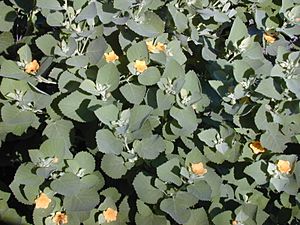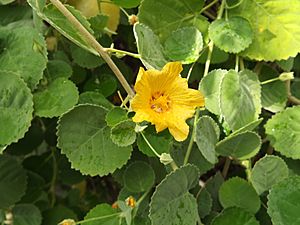Sida fallax facts for kids
Quick facts for kids Sida fallax |
|
|---|---|
 |
|
 |
|
| Scientific classification | |
| Genus: |
Sida
|
| Species: |
fallax
|
Sida fallax, known as yellow 'ilima, or in Hawaiian, ʻilima, is a species of herbaceous flowering plant in the Hibiscus family, Malvaceae, that occurs on some Pacific Islands. Plants may be erect or prostrate and are found in drier areas in sandy soils, often near the ocean. ʻIlima is the symbol of Laloimehani and is the flower for the island of Oʻahu.
It is known as Kio in Marshallese.
Description
The flowers are small, 0.75–1 in (1.9–2.5 cm) in diameter, have five petals, and are a golden yellow in color.
ʻIlima grows from 6 inches to 10 ft tall in prostrate (beach growing) and erect (upland shrub) forms. Lowland ʻilima, known as ʻilima papa, has silver-green foliage, mountain varieties have smooth, green foliage. Leaves can be long and narrow or rounded or heart-shaped with finely to coarsely serrated leaf margins. Flowers may be solitary or occur in small clusters.
Uses
Native Hawaiians used ʻilima flowers to make lei. It used to be seen as a lei for royalty, but can now be worn by anyone. The flowers are sometimes also used as a food garnish. It was also used medicinally. S. fallax is sometimes used as a groundcover in tropical areas.
See also
 In Spanish: Sida fallax para niños
In Spanish: Sida fallax para niños

